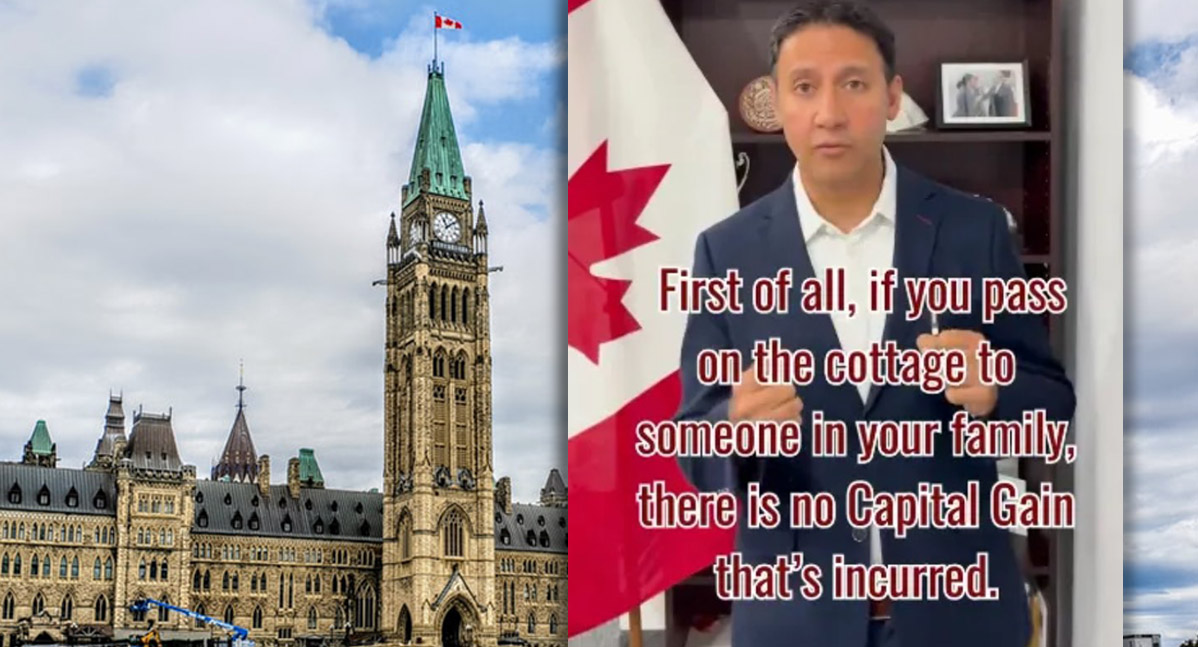
Blunderville: Justice Minister Arif Virani in Over His Head
Virani appointment of alleged antisemite to Human Rights Commission is followed by his releasing a video that seems to willfully mislead Canadians on Capital Gains Tax Impact
Attorney General and Justice Minister Arif Virani is proving that the Peter Principle is alive and well in the Trudeau cabinet. His first major blunder was announcing in June the appointment of Birju Dattani as Chief Commissioner of the Canadian Human Rights Commission (CHRC) for five years despite being aware of an alias he used (Mujahid Dattani) to make controversial antisemitic social media posts, including a presentation in which he allegedly said terrorism was a rational and successful strategy.
Shimon Fogel, the long-standing president of the Centre for Israel and Jewish Affairs (CIJA), says he is “deeply concerned” about Dattani’s appointment given that he “has directly associated with individuals and groups affiliated with listed terror entities and has a history of making highly troubling antisemitic statements.” Fogel saw Dattani’s ascension to head the CHRC as underscoring “a crisis of confidence” with the body that “undermines our confidence in the Commission’s ability to adjudicate issues of hate and discrimination.”
A Globe and Mail story on the appointment reported that Dattani has posted material X (Twitter), since deleted, that linked to an article comparing Israelis to Nazis, which is considered antisemitism under the IHRA definition adopted by the Canadian government. The Globe alleges there was a Tweet to an article likening Palestinians to Jews incarcerated in the Warsaw Ghetto and a joint conference appearance of Dattani with a member of Hizb ut-Tahrir, an Islamist fundamentalist organization which is opposed to the existence of the state of Israel and banned in Britain. The Globe also alleges that Dattani was interviewed at a rally featuring chants that “Zionism is terrorism”, where he personally called for a boycott of Israel.
Besides CIJA, B’nai Brith Canada and Friends of Simon Wiesenthal Center for Holocaust Studies have called for Virani to rescind the appointment, saying Dattani was “not suitable for this critical position at the CHRC.” They said that “at a time of rising antisemitism in Canada, it was essential that the CHRC represented Canadian values.
Ottawa Life Magazine contacted Virani’s office in the days following the appointment to inquire if it would be rescinded or if Virani would accept responsibility for the poor vetting of Dattani. His office acknowledged receipt of the questions from OLM but did not provide a response to the actual questions raised. Despite the Trudeau government’s deplorable record of doing little in the face of rising antisemitism toward Jewish Canadians, Virani has still not rescinded the appointment.
Instead, Virani found time to make what appears to be a willfully misleading explainer video that was posted on X to downplay the impact of the Trudeau government’s decision to increase the Capital Gains tax, which is a levy on the profit from the sale of assets or investments. The changes to this tax have been highly controversial and will increase the tax inclusion rate by 17% from 50% to 66.67. Critics say this change will negatively impact all Canadians, especially small business owners and those with investments.
Conservative MP Michelle Rempel Garner called out Arif Virani on X for posting what she called “an egregiously bad “explainer” video regarding the federal Liberal government’s highly contentious capital gains tax increase. The video was riddled with misinformation that could cost some Canadians big bucks if his advice is taken to heart.” Rempel Garner added, “To be clear, the Liberal’s capital gains tax increase will negatively impact every Canadian, no matter if they are claiming one on their tax return or not. But for those who do have to claim an increase, if those people took the claims Mr. Virani made in his video at face value, they could cause massive tax problems for them.”
To further refute the Virani misinformation, Rempel Garner posted a Q&A she did with fellow Conservative MP Philip Lawrence, who holds both a law degree and an MBA and focused his previous law practice on taxation.
We have published the Q&A below to provide the proper information to our readers.
Misleading Claims: Justice Minister’s Misinformation on Capital Gains Tax
Rempel Garner: Philip, let’s get right into it. In his video, Mr. Virani claimed, “People…have talked to me about the fact that they might have a second property, like a cottage. First of all, if you pass on that cottage to someone in your family, there is no capital gain that’s incurred.” Should people believe that?
Lawrence: No, because what he said was extremely misleading. There is no special definition for “family cottage” within federal tax provisions. The fact is that if someone owns a second property that they use for recreation unless they pass on that property to their spouse or common-law partner, capital gain is usually incurred. If the property is gifted or sold to anyone other than a spouse or common-law partner, someone will likely have to pay capital gains taxes on its increased value, so the Liberals’ new tax increase could apply to them.
Rempel Garner: Mr. Virani also claimed that capital gains of less than $500,000 won’t be affected by the new tax increase when he said, “If you do sell the cottage outside of your family, and you purchased the cottage for $300,000, and sell it for $800,000, there’s absolutely no change that affects you.” Is that true?
Lawrence: Well, let me clarify. In the federal budget—let’s remember that the Liberals haven’t yet tabled a bill to formally implement the tax increase—every Canadian is given a $250K exemption from the increased inclusion rate. Mr. Virani is fudging the truth by assuming that two spouses own a property equally, thereby allowing them to double the exemption. In many situations (because of the death of a spouse or otherwise), the property is only owned by one person, meaning that only one exemption is available. So, in Mr. Virani’s example, $250,000 could be taxable at the Liberals’ increased rate of 66.67%.
Rempel Garner: Referring to the same example above, Mr. Virani also says that only the amount above $500K is taxed at the new 66.67% rate. But that figure refers to the amount of income that is included for tax purposes, not the tax rate, right? What was he doing there?
Lawrence: Yes, exactly. He is conflating the inclusion rate (the amount of the gain that is taxed) with the income tax rate (the rate at which the gain is taxed). This discussion is complicated enough without the Federal Minister of Justice spreading misinformation.
Rempel Garner: Yikes, that’s brutal. From there, Mr. Virani went on to claim that the Liberals’ increase to the capital gain tax was competitive with other jurisdictions, specifically naming New York and California. He also talked about previous rates. All of it seemed a little sus to me. What are your thoughts?
Lawrence: I hate using this term, but gaslighting fits perfectly. He’s comparing apples to oranges here because the United States taxes capital gains differently than Canada. The United States reduces the rate of taxation—not the “inclusion rate.” For example, the current Federal capital gains rate in the United States (for long-term gains) is around 20%, which means even at a 100% inclusion rate, Americans are paying less on capital gains than Canadians are.
Additionally, the U.S. rates Mr. Virani referenced are state taxes only, which are significantly less than both U.S. federal tax and Canadian federal tax rates. For instance, the total capital gain tax on an asset sale in California (the state with the highest tax) is less than 14%. In Ontario, that rate will increase from 27% to around 31-32%.
This leads to another point Mr. Virani conveniently omitted. It is vitally important for Canada to have a competitive capital gains rate—particularly with the United States—because Canada is in the midst of a productivity crisis that is being fueled in large part by a lack of capital. Canadian workers are not receiving the investment they need to win in the global economy, and by making capital more expensive, we are only worsening the problem. So, the Liberals’ tax hike will translate into fewer jobs, lower standards of living for Canadian workers, and less revenue for the government—all of which are reasons why this tax should be opposed.
As for previous rates, another point Mr. Virani omits is that the rate pre-1996 included a zero-tax exemption on the first $100k of capital gains. This effectively reduced the actual inclusion of a $250k capital gain to less than 50%. Adjusted for inflation, that exemption would be almost 80% higher today, or about $180,000 at a zero rate. The Liberals don’t have this in place, so it’s false to directly compare their tax increase to previous rates.
Rempel Garner: A great point that leads nicely into my next question. Mr. Virani mentions something about a small business exclusion. However, the $1.25 million exclusion has many restrictions, and it applies only if qualifying small business shares are sold, so it won’t apply to all small businesses. Why would he make it seem otherwise?
Lawrence: First off, the current Capital Gains Exemption is $1 million, not $1.25 million, because the Liberals have not tabled legislation to make this change yet. Who knows what will be in that legislation—the Liberals have a habit of saying one thing and doing another. Further, this applies only to the sale of Qualified Small Business Shares. It does not, for example, apply if a business is not incorporated or if the business sells its assets (as opposed to the shares of the corporation). And small business incorporations do not benefit from the $250,000 personal exemption, which means that a higher inclusion rate will start on their first dollar of capital gains.
Mr. Virani is attempting to downplay the damage their increase in the capital gains inclusion rate will have on businesses, but the horse has already left the barn. A Canadian entrepreneur recently told me that the Liberals’ capital gains increase amounts to “a tax on our ambition.”
Rempel Garner: Mr. Virani made it seem like this wasn’t a big deal for small businesses, but their tax increase isn’t just about the small business shares we discussed above, right?
Lawrence: That’s right. Another reason many small business owners are upset about the tax increase is that they have investments in their companies, which they often use to save for retirement. The Liberals’ tax hike means that investment income will be taxed higher due to the change in the capital gains inclusion rate, thereby reducing the value of any potential retirement savings. The higher capital gains rate can also affect the small business tax rate on operating income. If investment income is more than $50,000, then the following year’s small business deduction will decrease, thereby increasing the tax rate on operating income.
This Liberal Government continues to increase the cost and difficulty of doing business in Canada, and Canadian workers will pay the price in lower wages and fewer opportunities.
Rempel Garner: Mr. Virani closes the video by suggesting that this tax increase will make life “more fair” for Canadians, but virtually every expert disagrees with this claim. I read a great article in the National Post a while ago that laid out why. What’s your take?
Lawrence: The best measure of individual economic strength, the underpinning of our standard of living, is GDP per capita. Over the last ten years, our GDP per capita has only grown by 4%, whereas over that same period, the United States’ GDP per capita has grown by 50%. In other words, our incomes have been stagnant while the cost of living has skyrocketed. There is absolutely nothing fair about the doubling of rents, record usage of food banks, and increasing rates of child poverty, so Mr. Virani’s claim is completely bunk. The Liberals’ increase to the capital gains tax will make things worse for all the reasons outlined in the article you referenced above.
Rempel Garner: What strikes me the most about Mr. Virani’s misinformation-riddled video, besides the fact that if some people take his word at face value they could be facing massive negative tax implications, is that he’s the Minister who is trying to ram through bill C-63, the Liberals’ latest massive censorship bill. You’re on the committee that regularly fights this type of censorship legislation. What does today’s misinformation-laden video from Mr. Virani on such a substantive, high-stakes topic say about the need to repeal the Liberals’ previous censorship legislation and prevent them from passing more?
Lawrence: Great point. Both Mr. Virani and I were taught about standards of care in law school. A standard of care is the level of competency you owe another individual. In simple terms, the more power you have, the greater your responsibility to those affected by your words and actions. As Minister of Justice, Mr. Virani has one of the highest standards in the country. For him to release this misinformation-filled video is irresponsible.
Rempel Garner: So, the question everyone wants to know the answer to: What are we (the Conservatives) going to do about all of this?
Lawrence: Our party leader, Pierre Poilievre, has vowed to oppose this job-killing tax.











